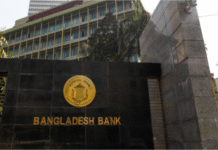Economists are wary of the new monetary policy that stresses on foreign aid to improve liquidity and boost growth.
Economists are wary of the new monetary policy that stresses foreign loans to improve liquidity and boost growth.
Instead, they prefer bringing down the interest on bank loans to spur investments.
“We have to pay back the foreign borrowings in dollar. Compounded with interest, this can become a huge burden for us during payback, it may strain our forex reserves,” economist Zaid Bakht told bdnews24.com.
“It is wrong to seek more foreign aid for liquidity, rather we should focus on creating an investment-friendly environment at home,” said former Bangladesh Bank governor Salahuddin Ahmed.
Pubali Bank’s Executive Director Helal Ahmed Choudhury feels domestic lending will come under pressure due to the stress on foreign borrowings under the new monetary policy.
Bangladesh Bank’s monetary policy for July-Jan 2014-15 fiscal year fixed private sector loan growth at 16.5 percent and said 2.5 percent of that would come from foreign loans.
The central bank for the first time has tagged foreign borrowings to domestic lending targets.
Therefore the private sector loan growth from domestic sources will stand at 14 percent.
For Jan-June 2013-14 fiscal, the target for private sector loan growth was set at 16 percent and the whole of that was targetted from domestic sources.
By May, loan growth with foreign borrowings stood at 15.7 percent.
“There are big projects coming up. Japan and China will be investing hugely. Investments will go up once these projects start. Domestic lending will increase with the foreign borrowings,” Bangladesh Bank Governor Ataur Rahman said on Saturday while announcing the monetary policy.
“There is no reason to worry,” he said. “More loans will be required once large infrastructure projects begin.”
But former central bank governor Salahuddin told bdnews24.com that there was “nothing new” about the latest monetary policy.
“One may say that there is no investment in the country. Banks are taking fewer deposits. Taking loans from foreign sources is not a good idea now,” he said.
“Our banks have a lot of money that is not being invested. The best thing to do now is to create an investment-friendly environment so that the funds are gainfully invested.”
Salehuddin said there were hints of another political unrest ahead and urged the central bank to plan skilfully and efficiently for overall development.
Zaid Bakht in his reaction to the new policy said that he saw in it an effort to encourage investments but had doubts about its success.
“We have to pay back the foreign borrowings in dollars. Along with interest, this can become a huge burden during payback and may strain our forex reserves,” he told bdnews24.com.
Bakht said local banks were unable to reduce interest rates, as they were saddled with a large number of big defaulters.
“If local interest rates are low, private companies won’t go for foreign loans,” he said.
Helal Choudhury said encouraging foreign loans would mean tighter competition for local loans. He recommended a combination of both.
Foreign loan flow into the private sector has been rising. Central bank data show that foreign loans worth $5.5 billion (Tk440 billion) had gone into the private sector in the past five years (2009 to 2013).
In 2009, foreign loans to the private sector was $412 million, and in 2013, $1.55 billion.
Private enterprises are opting for them because of their low interest rates. While local banks charge 16 to 18 percent on business loans, foreign interest rates are 8 percent at the most.
Source: bdnews24










